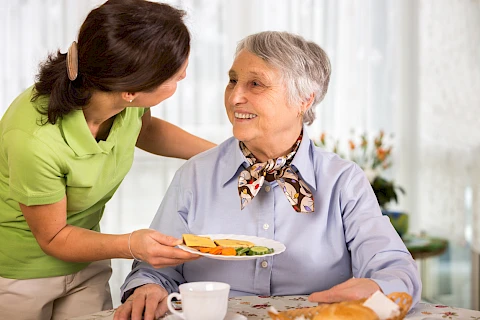
Parkinson's disease is a progressive neurological disorder affecting movement, often leading to tremors, stiffness, and balance issues. These symptoms can make eating and digesting food difficult. As caregivers, knowing the impact of nutrition in managing Parkinson's symptoms is essential. Proper nutrition can help alleviate symptoms and enhance the quality of life for individuals affected by the disease.
Parkinson's and Nutrition
Parkinson's disease can affect the way seniors eat and digest food. Tremors and muscle stiffness may make it difficult to handle utensils, while swallowing may pose a choking hazard. Furthermore, the digestive system may slow down, leading to constipation. Nutrition plays a vital role in mitigating these challenges. A well-balanced diet helps manage symptoms, support brain health, and improve energy levels.
Foods That May Help Manage Symptoms
Choosing foods that support brain health is crucial for individuals with Parkinson's:
- Omega-3 fatty acids, found in fish and flaxseeds and known for their anti-inflammatory properties, can support brain function.
- Antioxidants found in berries, nuts, and green leafy vegetables help combat oxidative stress, a condition prevalent in Parkinson's disease.
- Fiber-rich foods, such as whole grains, legumes, and fruits, can aid digestion and help prevent constipation, a common issue among individuals with Parkinson's.
Foods to Avoid
Certain foods may exacerbate Parkinson's symptoms, and those with the disorder should consume them with caution:
- Processed foods high in saturated fats and artificial additives may contribute to increased inflammation and oxidative stress.
- High-sugar items can lead to weight gain and other health problems. To manage these issues, caregivers should aim to prepare meals using fresh, whole ingredients, prioritizing balance over convenience.
Mindful grocery shopping and meal planning can significantly affect symptom management.
Meal Preparation Tips for Parkinson's Challenges
Preparing meals for a person with Parkinson's might require some adjustments:
- When dealing with swallowing difficulties, consider preparing softer foods or liquids that are easier to handle.
- Offering smaller, frequent meals can help maintain energy levels throughout the day.
- For individuals experiencing tremors, consider using utensils with large handles or weighty bases to enhance grip.
- Simple, nutrient-dense recipes can ensure each meal provides the necessary nutrients without overwhelming preparation demands.
- Maintaining a consistent meal schedule can help manage medication effectiveness and overall routine.
Hydration and Its Importance
Hydration is often overlooked but is crucial for managing Parkinson's symptoms. Adequate water intake improves digestion, prevents constipation, and facilitates the absorption of medications. Encourage regular water intake throughout the day, and consider offering beverages like herbal teas or water-rich foods, such as cucumbers and melons, to those who struggle to consume plain water. Establishing a regular drinking schedule also helps prevent dehydration.
Senior Helpers Southern New Hampshire Is Here to Help
Proper nutrition is a tenet of effective Parkinson's management for caregivers. By choosing beneficial foods, avoiding harmful ones, and adjusting meal preparation strategies, caregivers can significantly improve their loved ones' health and well-being.
If you reside in Manchester, Derry, Nashua, Dover, or Salem and need help caring for your senior family member, we encourage you to contact us today. We proudly serve seniors and their caregivers, including those with Parkinson's Disease and those requiring Respite Care.